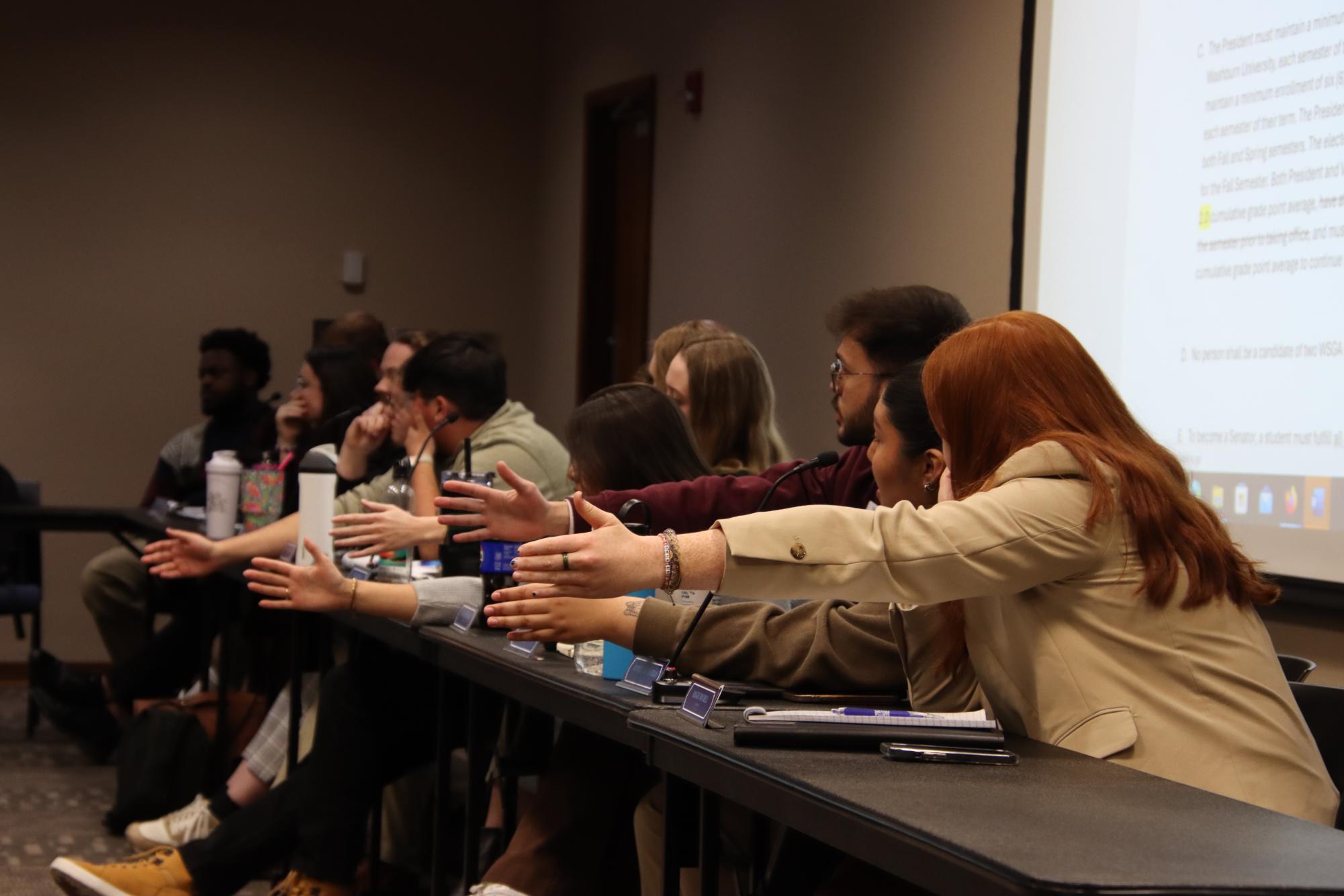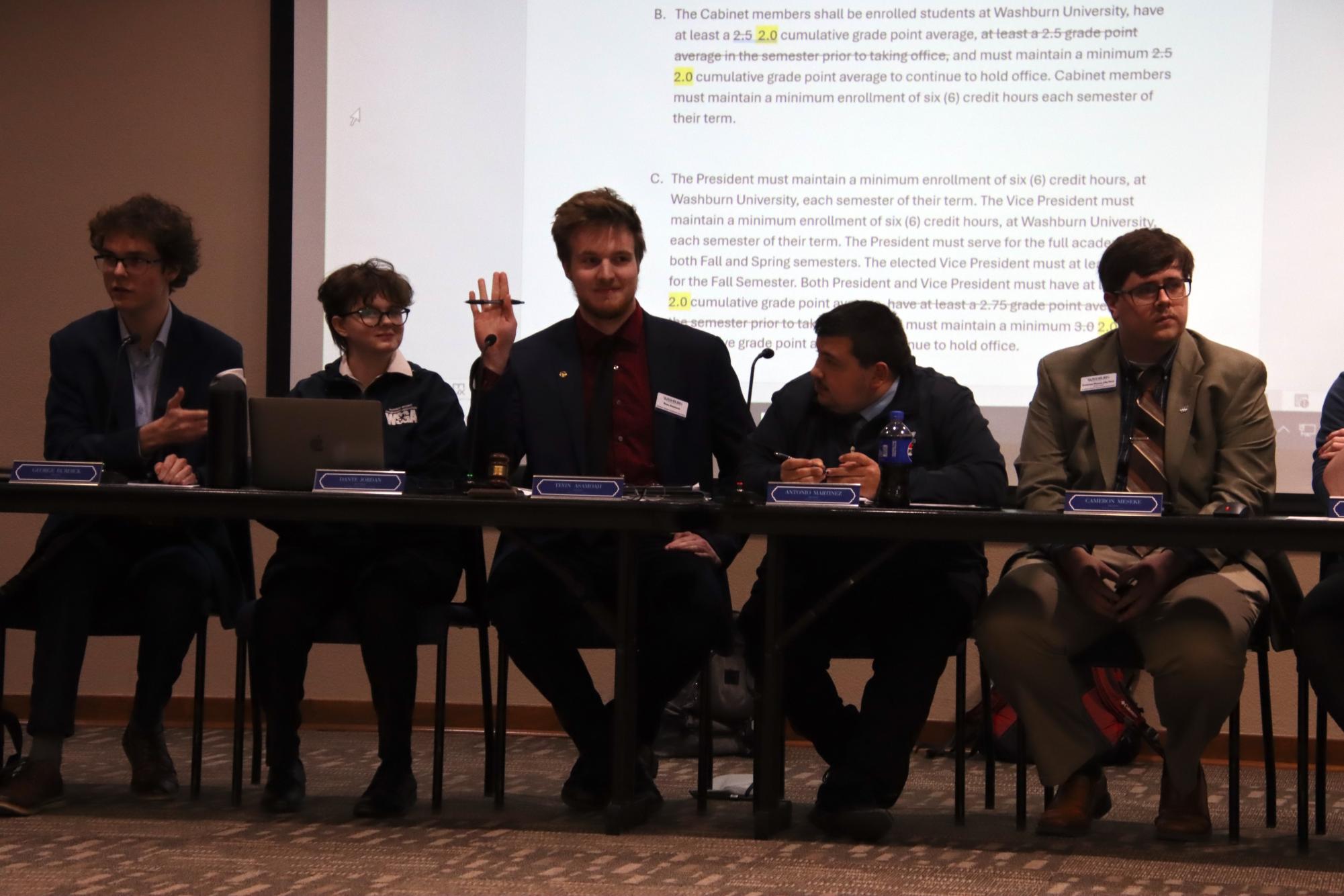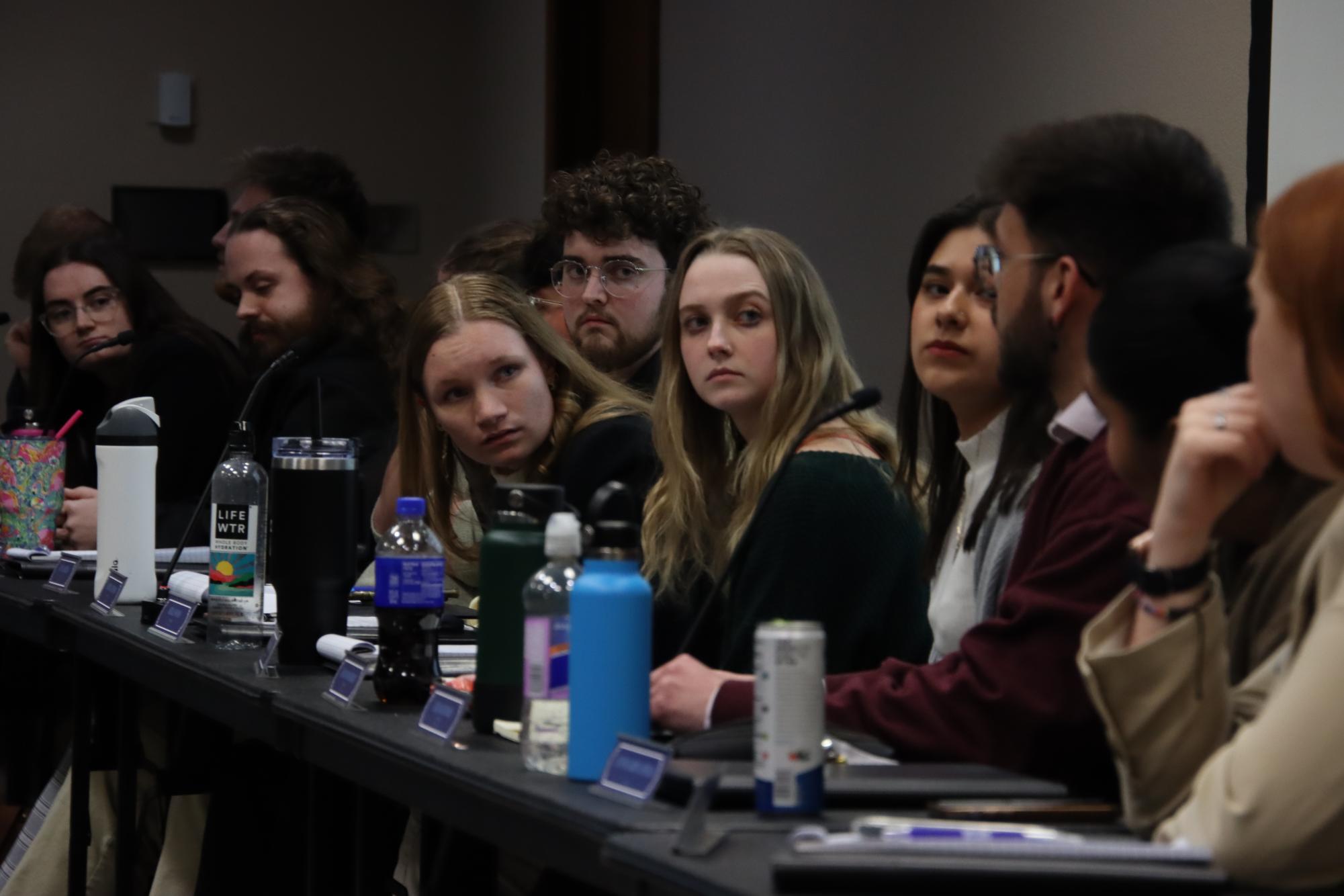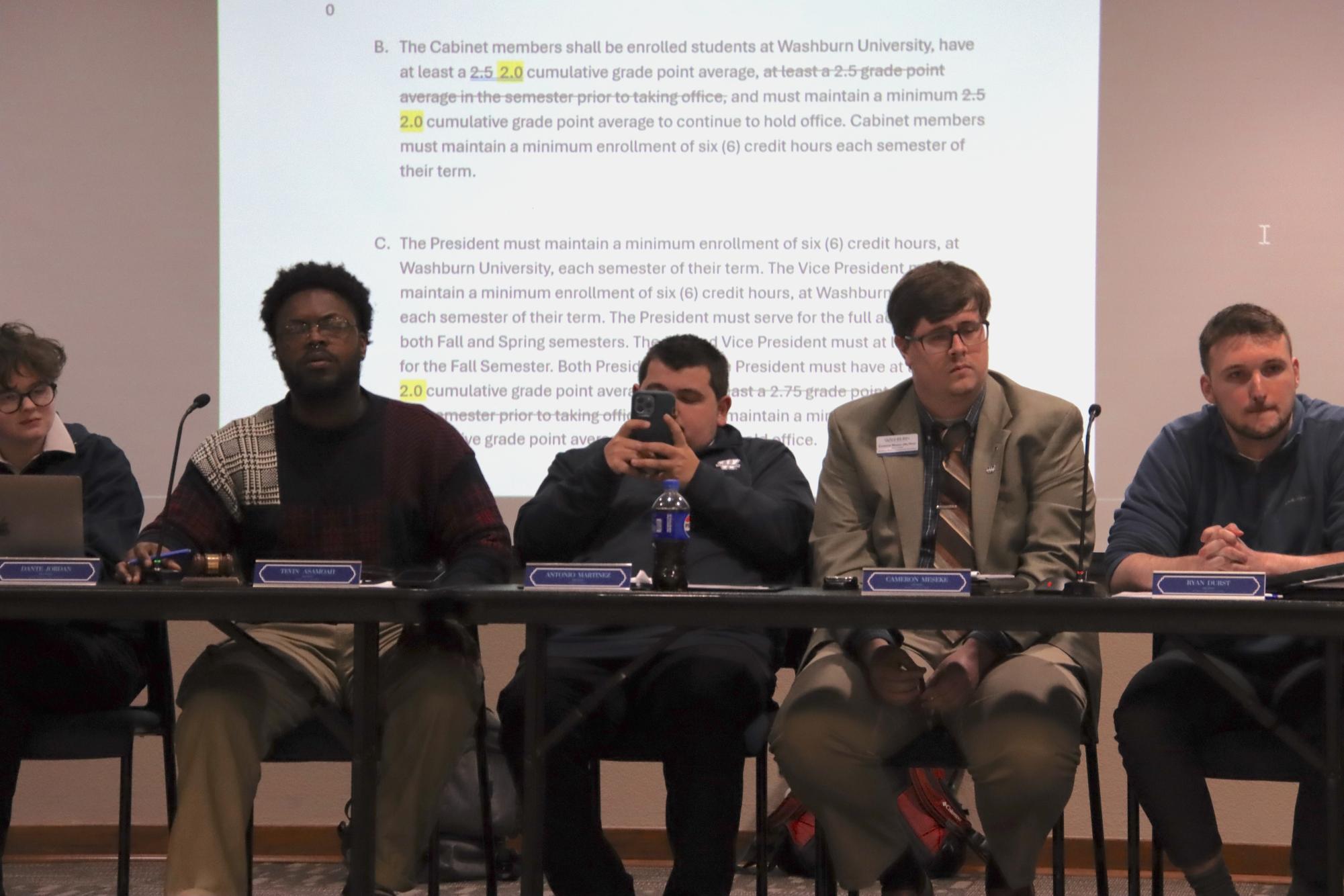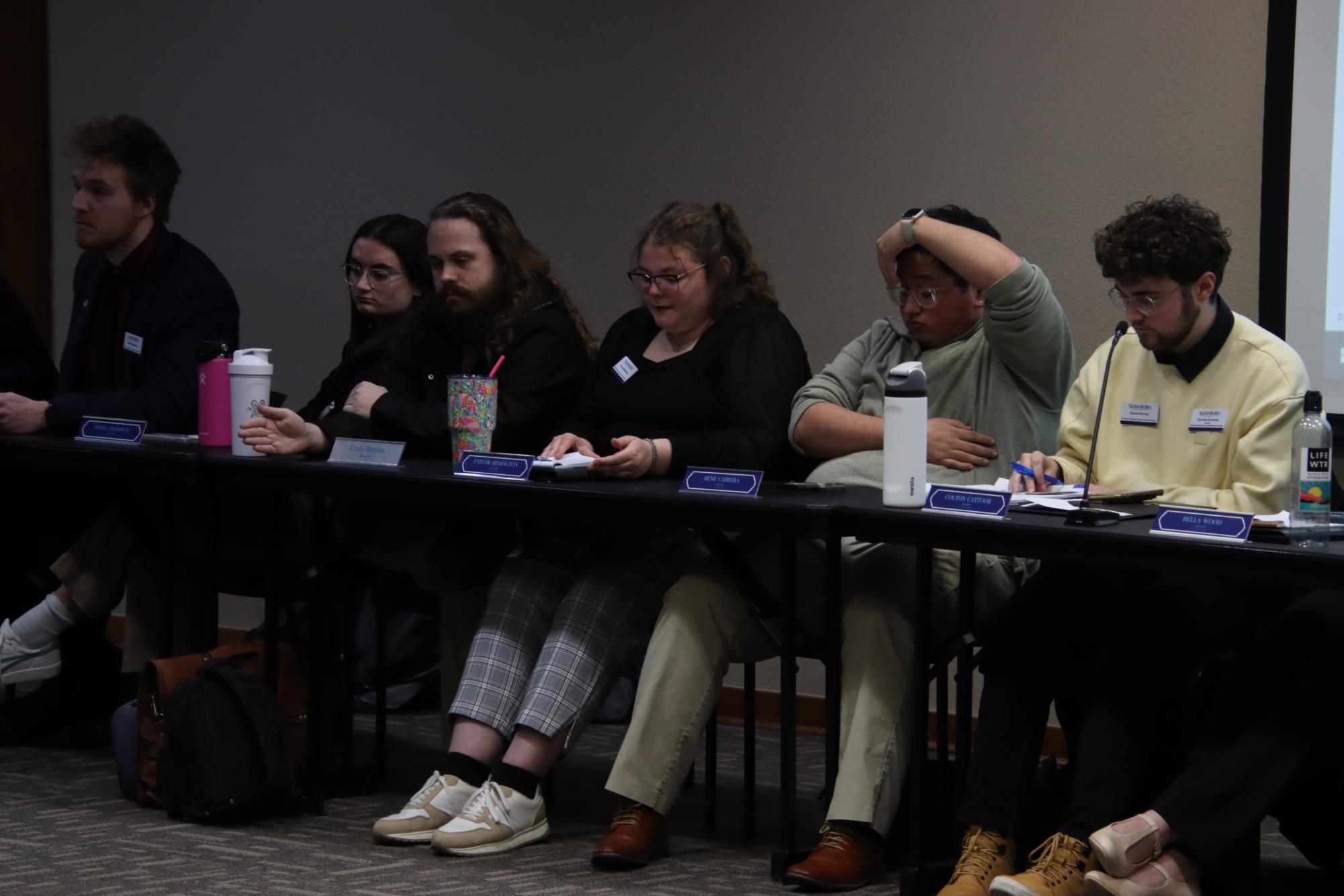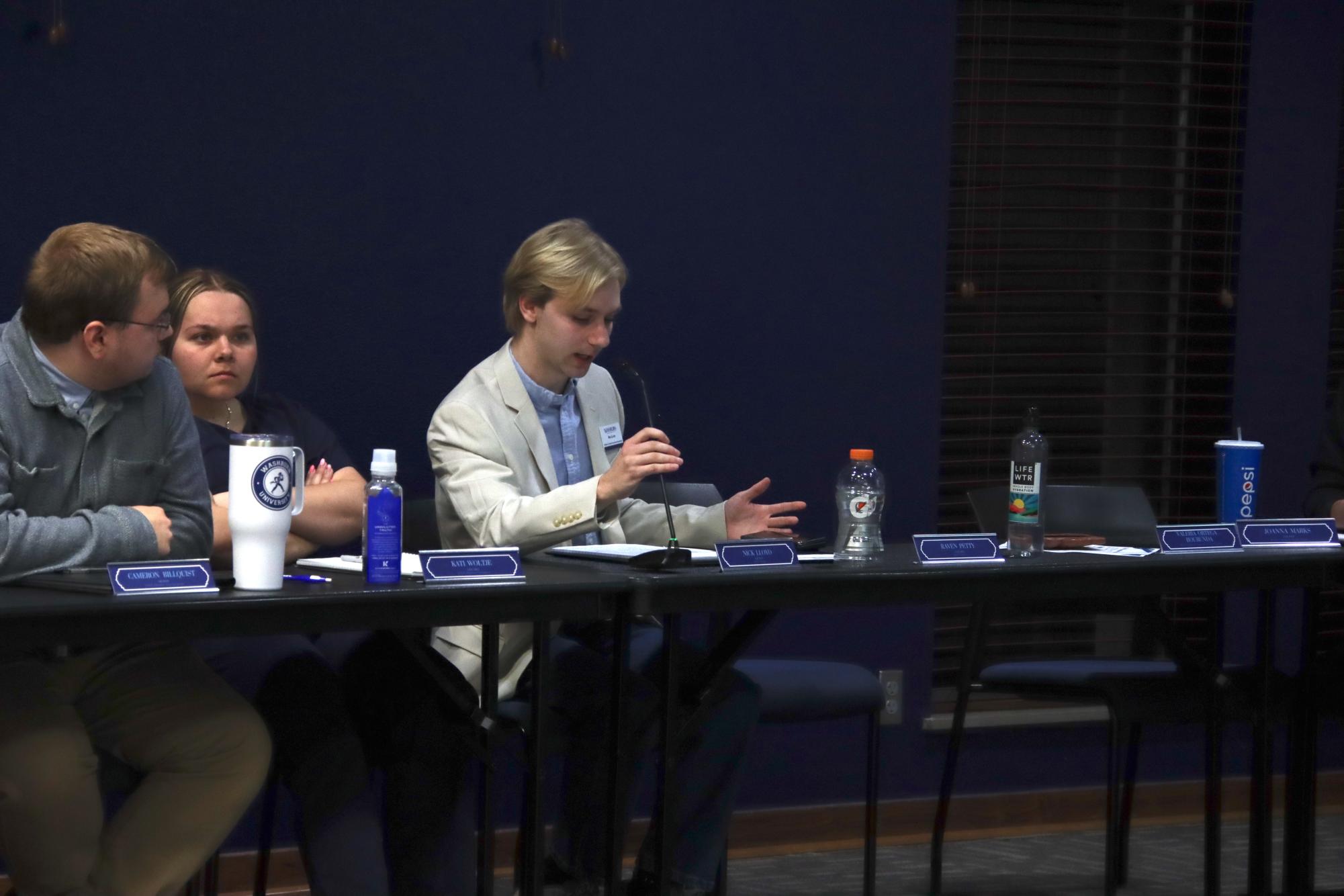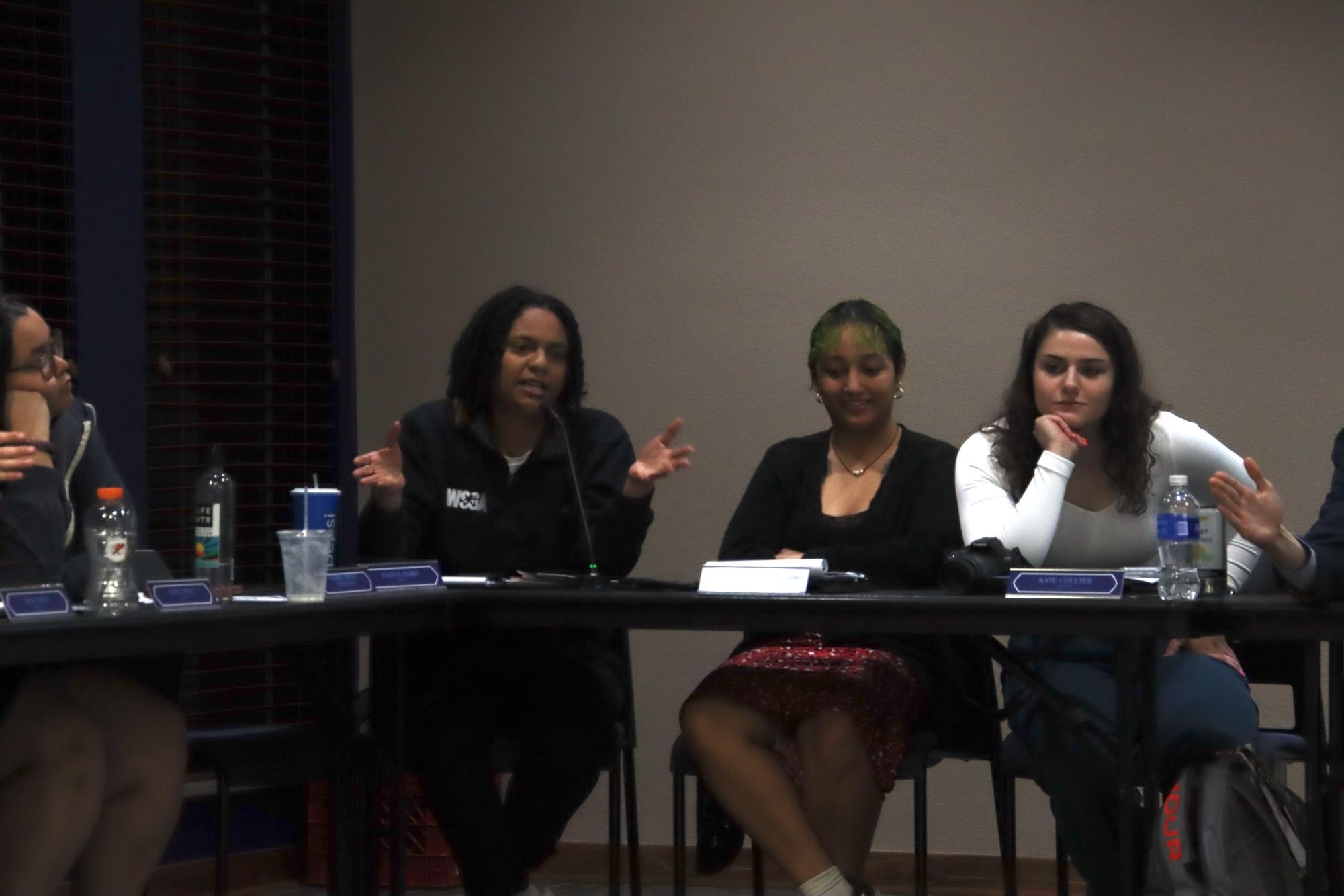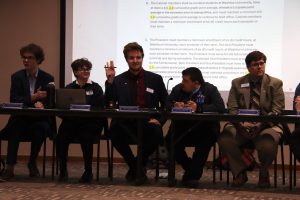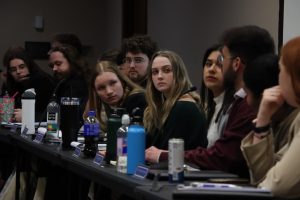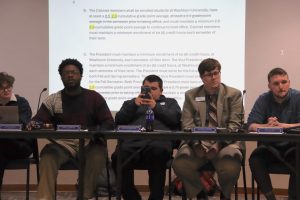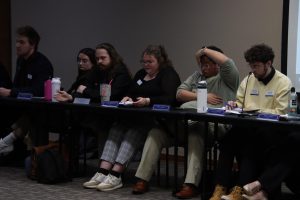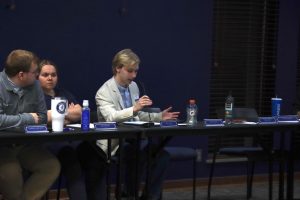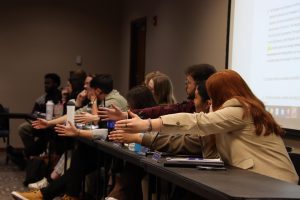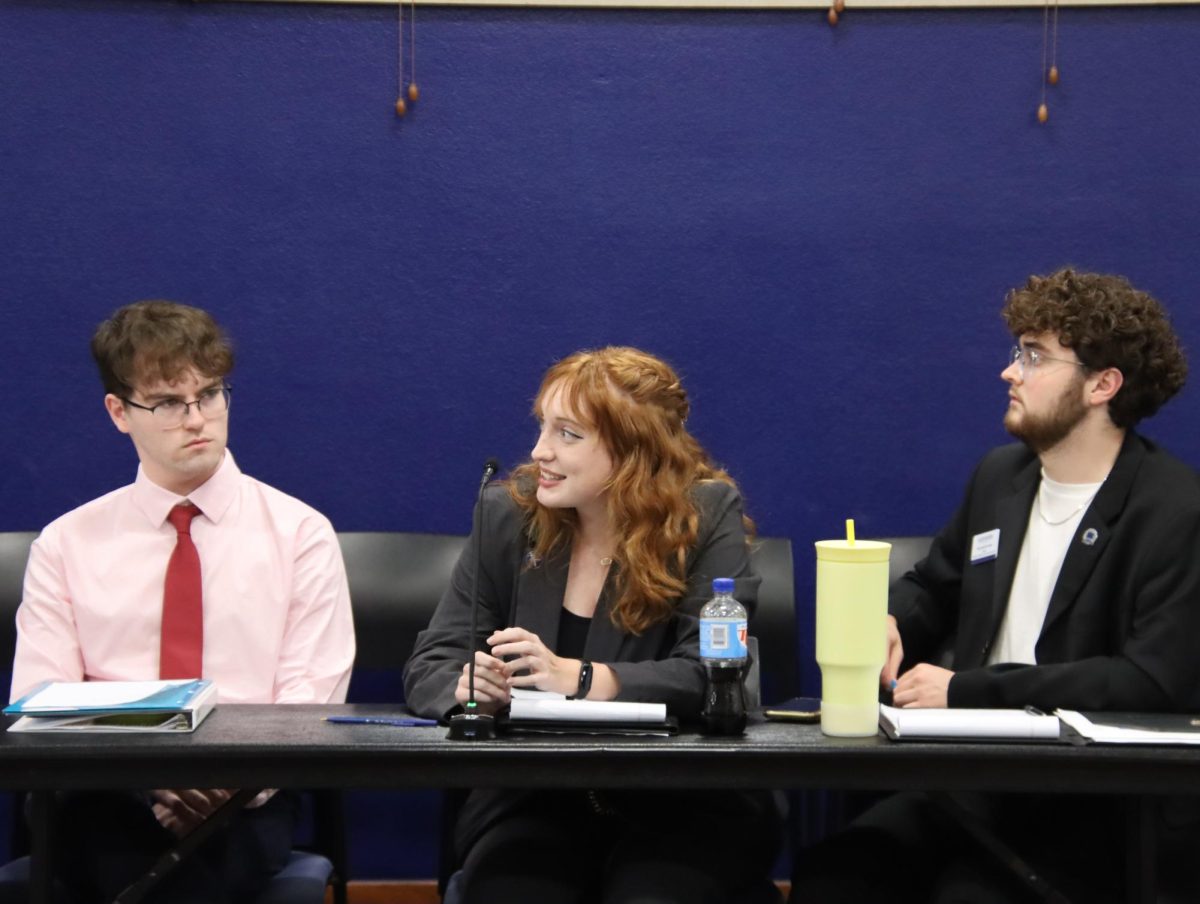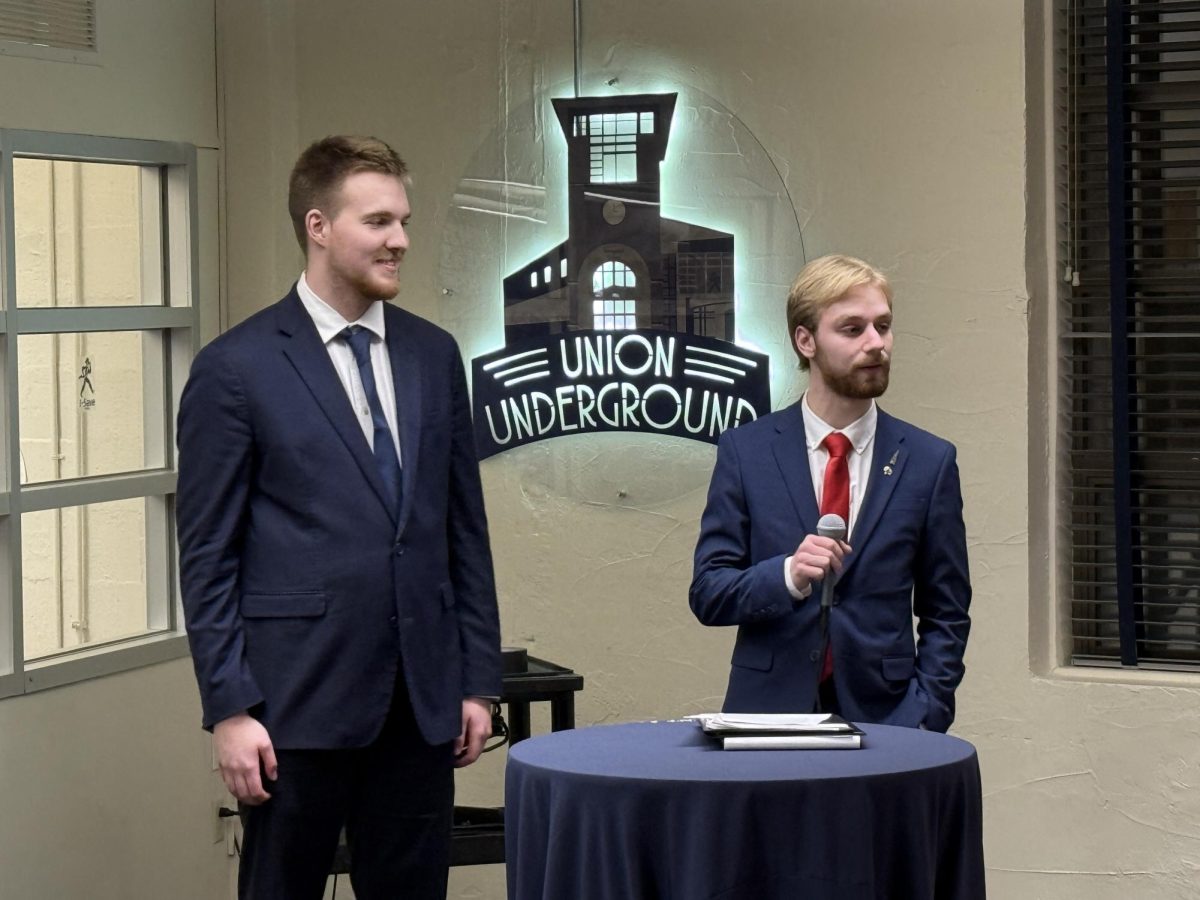Senator bill 96 was put through the wringer at the Washburn Student Government Association’s fifth meeting of the semester.
The bill was brought to senate by Mae Atakpa, chairperson who changed the wording for GPA requirements for cabinet members, president and vice president. Wording for the semester prior was also struck out the by-law as well.
Atakpa reported the findings for the bill in the Diversity, Equity and Inclusion Committee as favorable status. Bella Wood, senator and current candidate for vice president, questioned the findings of this bill since it did not go through Internal Affairs.
Brycen Labertew, parliamentarian, addressed the question and suggested voting for which committee will proceed with the findings of this bill.
“In this case, we’re going to have to vote on what committee takes precedence,” Labertew said. “Previously we have had bills concerning the constitution go through IA, which is why we went through that committee. I was unaware that it was going through DEI.”
Atakpa was contacted about meeting with IA before the senate meeting but was at work.
“I wasn’t in IA because nobody told me that it had to go through IA until 2:22 p.m. when I was at work. And they’re like, ‘Hey, can you come in?’ I was like, ‘No, because you just told me. I sent it in on Tuesday’, and everyone was like, ‘Okay, this is fine,’” Atakpa said.
She continues to address how there are no clear guidelines for situations like this and how the bill should still go through DEI.
Renee Cabrera, senator, suggested the conversation surrounding the bill and it not being in the right committee should be discussed since he had his own troubles with IA.
“I will say from my perspective, I submitted a couple of bills and I was also given last minute opportunity to come and speak, and I had to make arrangements so I didn’t feel as prepared,” Cabrera said.
Nick Lloyd, senator, and Wood believe the findings for DEI should be rejected and the bill should go through IA as it follows protocol.
“Seeing as most by-law changes go through IA and that’s just how the precedent is, I believe that we should see what IA has to say about the bill and reject the findings of the DEI committee,” Lloyd said.
Tevin Asamoah, vice president, clarified how it did not have to go through IA, and it could go through whichever committee.
Asamoah called for a vote to hear the bill, and it was voted in favor of being heard at senate.
When the discussion of the bill started, multiple senators spoke on whether or not it should be passed. The discussion seemed to deem students of lower GPAs as not leadership material or people who are not able to handle a bigger workload outside of regular classes.
“GPA overall most usually reflects your time management skills and your ability to balance student life and other means,” Lloyd said. “Being that we have to work with the Washburn administration, we should be putting our best foot forward in order to bring about change on campus.”
A position on the WSGA cabinet can lead to stress and the chances of your GPA lowering. Taylor Reddington, senator, believes a higher GPA would allow a student to be better prepared for higher positions for WSGA.
“Although GPA [does not] reflect directly who a person is, I know in higher positions that can tend to tank one’s GPA just a little bit, having all these responsibilities. So I do want to keep that in mind that in these higher positions, there is more stress involved, meaning less focus on academics is able to be there,” Reddington said. “So that GPA is likely to lower itself while they’re in that position. Just for the well-being of whoever is holding those positions, it may just be easier. Not necessarily easier, but more comfortable for them to have a higher GPA. So that is not to affect them greater in the future.”
Cody Dannar, senator, suggested tabling the bill because it may seem like it would help people with elections.
“I’m in favor of tabling this indefinitely just because elections are coming up and it is being put forth by someone who is in the current election system,” Dannar said. “Until after the elections, until this isn’t viewed as being influenced by her elections or on the elections. That’s what I’m trying to say without stepping [on] toes.”
Currently, George Burdick, budget director, and Wood are running for presidency, alongside JoAnna Marks, DEI director, and Aptaka as write-ins.
Emma Anderson, vice chairperson, wanted to table the bill indefinitely to end the meeting because she was tired and didn’t want to be in a hostile environment.
“I just wanted to say, respectfully, I love and care about you all. It is 8:30 at night. I understand that this is very important, and so, therefore, I suggest that we possibly table this for next week and have the creator of this bill speak with IA,” Anderson said. “We can hash all of that out, and then we can come into this next week with fresh eyes and tackle this as a group that is not exhausted and that has their priorities straight, and that is not going to get hostile.”
Asamoah wanted to clear up how tabling would lead the person who created the bill to restart the process all over again.
“Point of information. If this is to be sent back to the originator in IA, it would have to be tabled indefinitely, and it would have to receive a new number and go through the beginning stages again.”
Anderson still believed it should be tabled even after the point of information. Marks made a point about how this bill is important to students and elections.
“I agree that we have been here a long time, but I disagree with the statement because we are here to serve students, and it seems like it is regarding the election time, which this will be tabled beyond that. And for some reason, we have a big thing of saying no when we should just be serving students,” Marks said. “And if we’re saying this will be exclusive and not including a big amount of students, I think it is something we should go ahead and give favorable status. And I see people saying we should move it to IA, which is full of another candidate’s campaign team. I think we should pass still because of the amount of students that would be able to join.”
Maggie Bourel, senator, agreed with Marks’ point and wanted to remind everyone what their roles are as senators.
“Although we are tired. We all knew what we were signing up for when we decided to run as senators. We are serving the students, and to just table this indefinitely is doing our students and our student body an injustice.[/pullquote]“Therefore, I think we should just get over the fact that we’re all tired and continue discussing this bill so we can get over it and it passes or fails. But we need to be serving our students with that mindset rather than a selfish, tired mindset.”
Senators for the bill explained that a GPA should not be held over someone’s head when going for leadership positions.
Atapka addressed the privilege of being able to have a high GPA when life stressors are coming from every way. She believes if someone feels comfortable enough to apply for the position, they should be able to. Atakpa also feels it is “a punch in the face to say … ‘You have poor time management’” when restricting GPA in chair positions.
WSGA cabinet positions are paid and it is an opportunity for people in those positions to fill that role while also having an income.
“But cabinet members can make money, and the president, vice president can make money, and while chairpeople do make money, there’s less of an opportunity. I just think that we’re still taking away opportunities from people,” Atapka said.
Marks believes the current bill is doing a disservice to a certain group of people and GPAs take a while to raise after a hard semester.
“…I don’t like that idea at all because that is just keeping a very certain demographic in certain positions. You are able to make [GPA] up later, but that is years time,” Marks said. “And so for you to be able to retake the classes, which you would have to pay for, which also will be disallowing another demographic that is just poor and such. And so that’s why I’m in agreeance with the bill, we should be able to pass that.”
Anderson called for a friendly amendment of changing the bill to 2.5 versus a 2.0 for the presidency.
“So, as it should read, based on the amendment, both the president and vice president must maintain a 2.5 cumulative GPA and have at least a 2.5 GPA in the semester prior to taking office and maintain a 2.5 cumulative GPA to continue to hold office as the amendment is proposed,” Asamaoh said.
Lloyd still believed the bill should be tabled until the next week.
There were no seconds and the bill was voted in favor of the friendly amendment.
After the discussion of the bill, senators were called to vote in a separate room with Antonio Martinez, president of WSGA, Asamoah and Teresa Clounch, associate vice president of Student Life.
“Currently, the motion on the floor was to give, to adopt this bill and to ratify as the working rules or the by-laws for WSGA. As that motion fails, 7-12 no’s, it returns back to the senate. And we have to either do something with it or not do something with it,” Asomoah said. “So there must be a motion made to either table this, give it status, give it the same status, pass it or throw it away, essentially.”
The bill was tabled indefinitely.
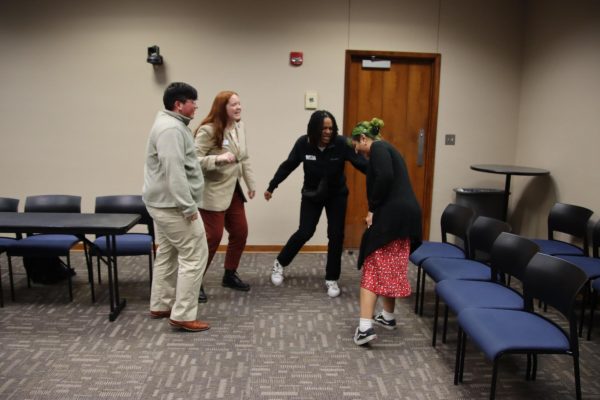
*Reporter’s note: Strong language was used regarding GPAs and students’ worth throughout the meeting and I believed getting more thoughts on why they believed what they did would have helped understand their point of view. The WSGA president told me I was only allowed to email WSGA members and that wasn’t a rule before. As reporters we have to talk to someone face to face, over zoom or a phone call. Emails allow interviewees to PR their answers or someone else answer for them. There were a lot of conversations going on at this meeting about conflict of interest which could be covered in an article all by itself. In my opinion this bill was not given a fighting chance because of elections. COME TO WSGA MEETINGS @ EVERYONE. ty
Edited by Jeremy Ford and Aja Carter





